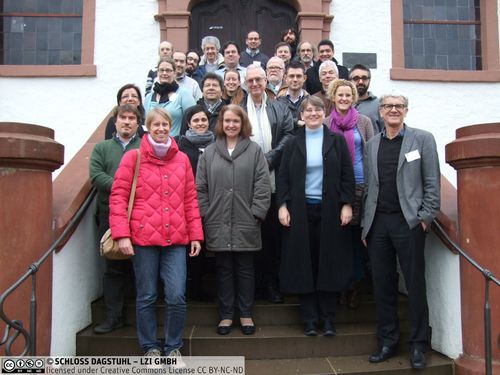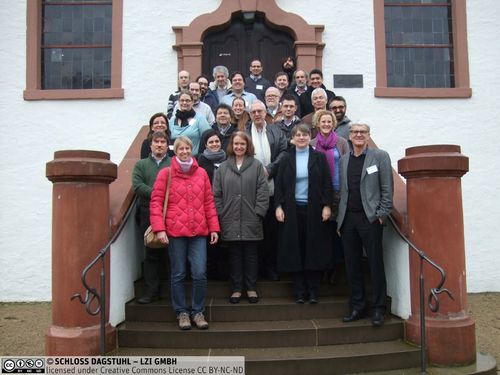Dagstuhl Seminar 14512
Collective Adaptive Systems: Qualitative and Quantitative Modelling and Analysis
( Dec 14 – Dec 19, 2014 )
Permalink
Organizers
- Jane Hillston (University of Edinburgh, GB)
- Jeremy Pitt (Imperial College London, GB)
- Martin Wirsing (LMU München, DE)
- Franco Zambonelli (University of Modena, IT)
Coordinator
- Matthias Hoelzel (LMU München, DE)
Contact
- Annette Beyer (for administrative matters)
Schedule
Modern systems are often structured as complex, multi-layered networks of interconnected parts, where different layers interact and influence each other in intricate and sometimes unforeseen ways. It is infeasible for human operators to constantly monitor these interactions and to adjust the system to cope with unexpected circumstances; instead systems have to adapt autonomously to dynamically changing situations while still respecting their design constraints and requirements. Because of the distributed and decentralized nature of modern systems, this usually has to be achieved by collective adaptation of the nodes comprising the system. In open systems exhibiting collective adaptation, unforeseen events and properties can arise, e.g. as side effects of the interaction of the components or the environment. Modelling and engineering collective adaptive systems has to take into account such "emergent" properties in addition to satisfying functional and quantitative requirements.
Finding ways to understand and design collective adaptive systems, and to predict their behaviour, is a difficult but important endeavour. One goal of this seminar is to investigate techniques for modelling and analysing systems that adapt collectively to dynamically changing environment conditions and requirements. In many cases, these models and analysis techniques should not only capture qualitative properties of the system, such as absence of deadlocks, they should also be able to express quantitative properties such as quality of service.
Research on collective adaptive systems builds on and integrates previous research efforts from several areas:
- Formal foundations and modelling techniques for concurrent systems deal with problems such as enabling and limiting concurrency, access to shared resources, avoidance of anomalies, communication between processes, and estimation of performance.
- Analysis of concurrent systems typically exploits such notions as bisimilarity of different processes or reasons on stochastic properties of systems consisting of many equivalent processes.
- The area of adaptive systems also investigates systems consisting of interacting entities, but is more concerned with the reaction of whole systems or individual actors in a system to a changing environment.
An important aim of this seminar is to combine research from concurrent systems with results from the adaptive systems community in order to develop formalisms for specifying collective adaptive systems, to increase the scalability of qualitative and quantitative modelling and analysis techniques to large systems, and to apply them to systems that dynamically change their structure or adapt to novel situations.
The seminar will focus on the following topics:
- Process calculi, types and logics for collective adaptive systems
- Modelling techniques and languages for collective adaptive systems based on the above formalisms
- Quantitative and qualitative analysis techniques for collective adaptive systems.
The seminar will feature talks by the participants, interleaved with working groups in areas such as "Modelling and analysing systems which change at run time" and "Scaling qualitative and quantitative modelling and analysis methods". The last day will be reserved for the presentation of the results of the working groups, joint discussion, and planning of future joint activities between the participants. To disseminate the results of the seminar, we plan to edit a special issue in a suitable journal.
Modern systems are often structured as complex, multi-layered networks of interconnected parts, where different layers interact and influence each other in intricate and sometimes unforeseen ways. It is infeasible for human operators to constantly monitor these interactions and to adjust the system to cope with unexpected circumstances; instead systems have to adapt autonomously to dynamically changing situations while still respecting their design constraints and requirements. Because of the distributed and decentralized nature of modern systems, this usually has to be achieved by collective adaptation of the nodes comprising the system. In open systems exhibiting collective adaptation, unforeseen events and properties can arise, e.g. as side effects of the interaction of the components or the environment. Modelling and engineering collective adaptive systems (CAS) has to take into account such "emergent" properties in addition to satisfying functional and quantitative requirements.
Finding ways to understand and design CAS, and to predict their behaviour, is a difficult but important endeavour. One goal of this seminar was to investigate techniques for modelling and analysing systems that adapt collectively to dynamically changing environment conditions and requirements. In many cases, these models and analysis techniques should not only capture qualitative properties of the system, such as absence of deadlocks, they should also be able to express quantitative properties such as quality of service.
Research on CAS builds on and integrates previous research efforts from several areas:
- Formal foundations and modelling techniques for concurrent systems deal with problems such as enabling and limiting concurrency, access to shared resources, avoidance of anomalies, communication between processes, and estimation of performance.
- Analysis of concurrent systems typically exploits such notions as bisimilarity of different processes or reasons on stochastic properties of systems consisting of many equivalent processes.
- The area of adaptive systems also investigates systems consisting of interacting entities, but is more concerned with the reaction of whole systems or individual actors in a system to a changing environment.
An important aim of this seminar was to combine research from concurrent systems with results from the adaptive systems community in order to develop formalisms for specifying CAS, to increase the scalability of qualitative and quantitative modelling and analysis techniques to large systems, and to apply them to systems that dynamically change their structure or adapt to novel situations.
The seminar was organised with a mixture of talks and working group sessions which facilitated more in-depth discussions and exploration of topics. In this report we include the abstracts of a selection of the presented talks, and three longer contributions compiled after the meeting which seek to reflect the activities of the working groups. The first group, considering modelling, specification and programming for CAS, start their presentation with brief descriptions of four diverse applications developed on the basis of CAS, ranging from national level power management to personal wearable devices. To complement this identification of application domains, the group also catalogued common and contrasting features that can be found in CAS@. This consideration highlights the role of physical space in all the considered domains and the urgent need to develop modelling and analysis techniques which reflect this central role played by space. This was key amongst a number of challenges identified by the group in their conclusions. Spatio-temporal aspects were also identified as a key challenge by the second working group who considered verification of CAS. The report from this group outlines the role of verification within the design and management of CAS ranging from seeking to guarantee global emergent behaviour from local specifications to using online verification to drive adaptation. Two specific challenges were explored in more detail, namely handling the inherent uncertainty in CAS, and specification and verification of spatial properties of systems composed of self-organising patterns. The third working group focused on the issues that arise from the recognition that some of the entities within a CAS may be humans and outside technological control, i.e. the design of socio-technical systems. A number of different scenarios are provided to illustrate the difference between socio-technical CAS and 'technical’ CAS, and the human factors which must be taken into account. To remediate some of the problems identified, the group propose the idea of a general intervention framework, based around the 3I life-cycle - inspection-innovation-intervention. It was foreseen that intervention would be achieved by shaping mechanisms, and the report goes on to describe some possible shaping mechanisms which were considered. To conclude a number of research challenges are discussed.
 Jane Hillston and Jeremy Pitt and Martin Wirsing and Franco Zambonelli
Jane Hillston and Jeremy Pitt and Martin Wirsing and Franco Zambonelli
- Jacob Beal (BBN Technologies - Cambridge, US) [dblp]
- Lenz Belzner (LMU München, DE) [dblp]
- Luca Bortolussi (Universität des Saarlandes, DE) [dblp]
- Giacomo Cabri (University of Modena, IT) [dblp]
- Rocco De Nicola (IMT - Lucca, IT) [dblp]
- Giovanna Di Marzo Serugendo (University of Geneva, CH) [dblp]
- Vashti Galpin (University of Edinburgh, GB) [dblp]
- Marco Gribaudo (Polytechnic University of Milan, IT) [dblp]
- Salima Hassas (University Claude Bernard - Lyon, FR) [dblp]
- Jane Hillston (University of Edinburgh, GB) [dblp]
- Annabelle Klarl (LMU München, DE) [dblp]
- Roberta Lanciani (IMT - Lucca, IT) [dblp]
- Peter R. Lewis (Aston University - Birmingham, GB) [dblp]
- Michele Loreti (University of Firenze, IT) [dblp]
- Stefano Mariani (Università di Bologna, IT) [dblp]
- Mieke Massink (CNR - Pisa, IT) [dblp]
- Ugo Montanari (University of Pisa, IT) [dblp]
- Laura Nenzi (IMT - Lucca, IT) [dblp]
- Jeremy Pitt (Imperial College London, GB) [dblp]
- Christophe Scholliers (Free University of Brussels, BE) [dblp]
- Hella Seebach (Universität Augsburg, DE) [dblp]
- Nikola Serbedzija (Fraunhofer FOKUS - Berlin, DE) [dblp]
- Mirco Tribastone (University of Southampton, GB) [dblp]
- Petr Tuma (Charles University - Prague, CZ) [dblp]
- Danny Weyns (Linnaeus University - Växjö, SE) [dblp]
- Martin Wirsing (LMU München, DE) [dblp]
- Franco Zambonelli (University of Modena, IT) [dblp]
Classification
- modelling / simulation
- semantics / formal methods
Keywords
- Qualitative and quantitative reasoning
- autonomic and adaptive systems
- swarm computing
- self-awareness
- formal methods



 Creative Commons BY 3.0 Unported license
Creative Commons BY 3.0 Unported license
